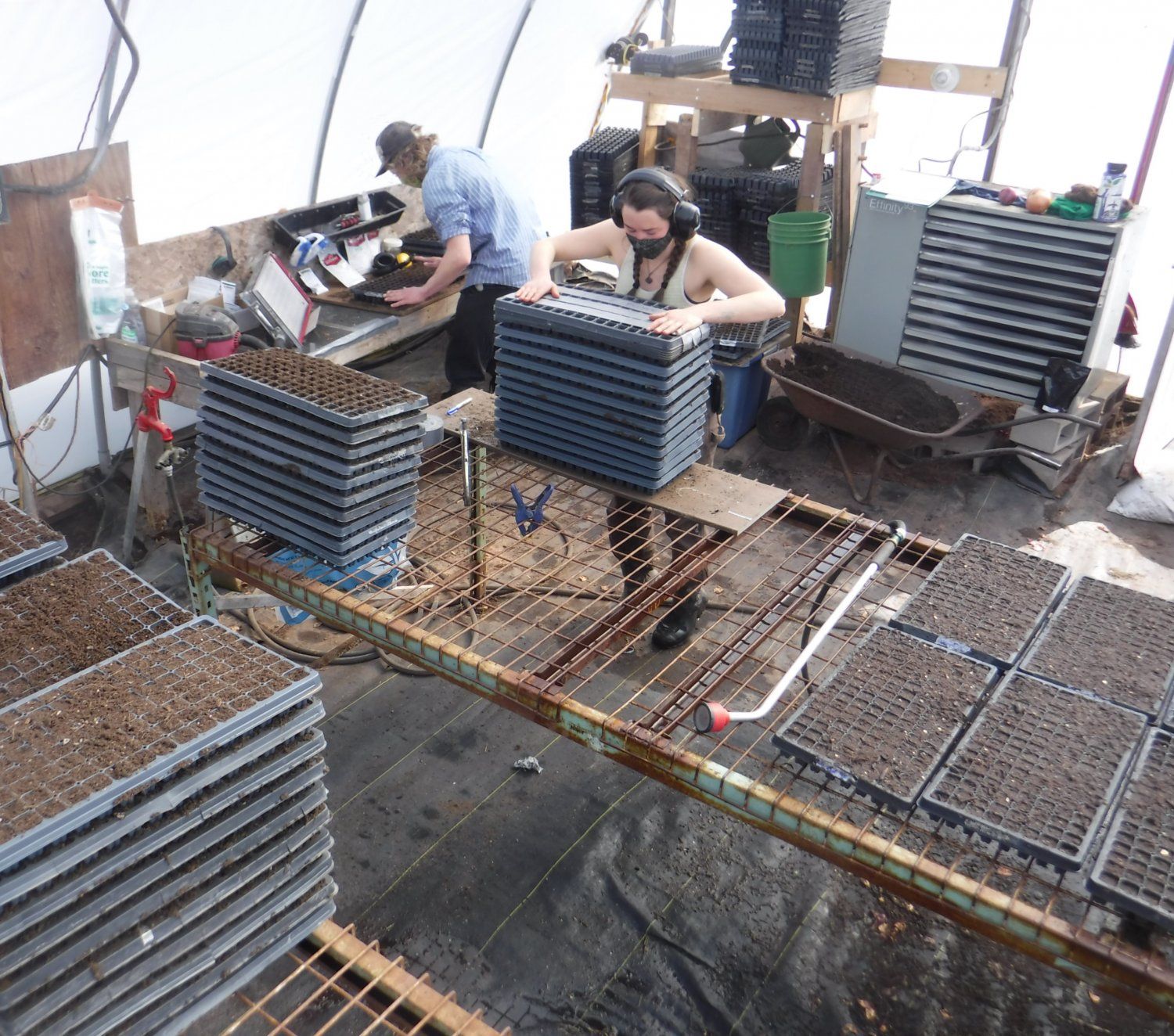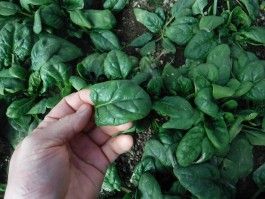Wow, what a heat wave! We had temps of 21 below less than a week ago, and some of our neighbors in lower areas had better than 30 below. Makes my face hurt just thinking about it! As I write this letter to you it is 40 degrees outside, and maple trees are beginning their sap run. What a change! I certainly won't complain - that bitter cold makes everything so much harder. The ice that had frozen closed the door to the microgreen room has finally thawed, and it looks like (for now) we're out of the woods on those frigid temps. Springtime is a'comin'.
I hope the snow was good enough out there for all those folks (perhaps you were one of them?) that participated in the 47th annual Birkebiner Ski Race virtually this week. This crazy weather makes it tough to figure out which kind of wax to use on the skis. It's time to scrape off that cold weather wax and get the warm weather wax on those skis this week. Now, imagine trying to plan out vegetable production with 60 degree temperature swings in the weather from one week to the next - that's what spring planning is like for us farmers! These early warm temps can make a farmer want to jump the gun and start planting, but we're holding the line and sticking to our schedule. If you wax your skis planning for warm weather and the temps drop again, changing the wax on your skis is doable. But if we start planting with the first warm temps and the thermometer drops suddenly a few weeks later after seedlings are transplanted in a hoophouse, those cold temps can wipe out weeks of work. And by that time, it's too late to replant some of those early crops, too late for a "do-over." So it's still one more week until we fire up the greenhouse.
Earlier this week, I pulled off the heavy, white floating row cover protecting our winter hoophouse grown spinach from the past few weeks of arctic air. We did have some areas where the spinach leaves were damaged from exposure to the deep chill, but overall it survived pretty well. The sunshine this week has begun to bring the spinach out of hibernation and back to life as daytime temps climb well above freezing in the hoophouses. It's not quite ready to harvest yet, but we should have plenty of spinach for the mid-March CSA delivery. Once it starts to warm up and grow again, the plant will change it's growth habit from low to the ground and spread out to more upright leaves, standing tall for easy harvest. You can see the new leaves in the center of the plants starting to reach up a little more than those outside leaves. In the winter time, just like some of us, that spinach likes to lay low. The first spring spinach harvest is an important ritual of spring here at the farm. It's the first crop we picking out of those hoophouses each year, and marks the beginning of a long, flavorful, and seasonal journey of SO. MUCH. GOOD. FOOD!
Meanwhile, in the micro room "tropics," we have been getting used to working with these special sunglasses designed to protect our eyes from the bright grow lights that the micros thrive under. The green lenses help make the plants look green instead of purple/pink, and definitely make that light a lot easier to work around. Plus, they look so good I just *might* start wearing them around town now and then!
I don't want to jinx us, but we've been continuing to experiment with better micro basil production, and we're making great progress. Check out the dense, uniform flat on the right compared to a control flat on the left in the picture below. Now we're talkin'. We've got 8 of these lush flats growing, and they should be ready for harvest for the next CSA delivery in March. We'll be starting more flats each week for regular availability, so start thinking about how to use that delicious basil!
This week, we'll have a few clamshells of beet microgreens available as well - always experimenting with something around here. They add a great pop of color and are really packed with nutrients, so if you like that earthy beet flavor, I'd suggest giving these a try. For the mid-March delivery, we'll begin offering some spicy mustard mixes as well if you are looking to spice up your plate a bit. Keep an eye out for those mustard micros next time, and here's what those beet micros look like:
If you are still looking for ways to incorporate microgreens into your meals, tacos are a great fit with micros! Taco night is one of our favorite, quick, and healthy dinners that everyone in our family can get behind. Microgreen cilantro is an easy inclusion, but we've replaced the lettuce with mild microgreen mix instead. Not only did micros add more nutrition than lettuce, they were one more local ingredient we could add (along with some Southshore Meats ground beef of course.) And it looked as great as it it tasted!
This past week, Farmer Ryan and I have been virtually attending the online MOSES conference (Midwest Organic and Sustainable Education Service), learning from fellow farmers across the Midwest and beyond. While it's disappointing not to have the face-to-face interactions with other growers, we have been making the most of the virtual setting, attending a host of sessions from how to better incorporate cover crops into our production, improving mechanical weed control, and of course talkin' shop on seed varieties.
In one of those seed sessions Thursday afternoon, I learned that our standard Acorn squash variety has been discontinued, and 2021 might be the last year that seed is available. We have enough seed for this season, but I am really glad to learn this now before the growing season instead of after our season is over. Usually, when a variety is discontinued, it's because California growers are looking for different traits that that variety contains - it could be that they are experiencing different disease pressures, market trends with size/shape of a crop, or have different general production goals. Most of the produce grown in the US is produced in CA, so seed breeders are always working to develop varieties that will meet the demands of CA growers. As you may have noticed, our climate is a touch different up here in the great Northwoods, and unfortunately nobody is breeding veggies to thrive here in the uppper Midwest. This makes finding varieties that thrive in our climate tricky at times.
When a variety that performs well for us is on the chopping block, we have to search for replacements, and begin trialing multiple different varieties out to see how they perform in our region compared to our old, now discontinued standard. Luckily, a fellow farmer from Tipi Produce in southern WI suggested a newer variety of acorn squash they have been trialing (and happy with) called Starry Night. She mentioned that it stored just as well as the variety we had been growing (called Taybelle), but the flavor was much better - plus, check out how pretty it is! I quickly grabbed the phone and called Johnny's Selected Seeds to try to order some seeds. As I mentioned last time, seeds have been in short supply, especially organic and untreated ones. Luckily they were in stock and I was able to get a thousand seeds of the Starry Night for us to try. I am looking forward to seeing how these new acorns grow and how they taste as well, so keep an eye out for them in your CSA boxes this fall and winter.

Finally, a few words from Farmer Brian, and a recipe you will want to hang on to for when that spinach starts coming again (if you don't just eat it all fresh right away!)
A big thank you to everyone for being with us for our winter CSA season. We have one more delivery of the winter shares on March 17/18th. Summer season starts the first week of June and we still have a few spots left in the CSA available for the summer, but anticipate selling out of some box types in the next few weeks. If you are worried about how to get our delicious products over the next two months we have you covered. Based on the popularity of the spring boxes we offered last year we will be continuing the program this spring by offering boxes through the Farmstand function on Harvie. These boxes will be available for pick up at the Chequamegon Food Co-op in Ashland, Trinity Lutheran Church in Duluth or via home delivery. Like last year, these boxes will be a la carte and contain everything we have available. Boxes are available for order Friday afternoon-Sunday evening. With Farmstand there is no weekly commitment so order whenever it suits you. The minimum order amount for a box will be $89. For more information check out the Farmstand feature on Harvie. Delivery will start on March 31st in time for the Easter Holiday.
Spinach and Artichoke Dip
1 bag chopped and lightly steamed spinach
14 oz artichoke hearts
2 garlic cloves peeled
1 cup mayo
1 cup parmesan cheese shredded
8 oz shredded mozzarella cheese
½ teaspoon thyme
½ teaspoon nutmeg
Pepper to taste
Pre heat over to 400. Pulse the artichoke hearts and garlic in a food processor. Mix the spinach artichoke hearts, garlic, may, parmesan, mozzarella, and seasonings together. Bake for 15-20 minutes until surface turns color.
That's it from us this week - have a wonderful weekend!
In community,
Farmer Chris
Great Oak Farm









